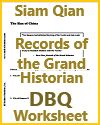| Writings of Confucius DBQ Worksheet |
|---|
| www.studenthandouts.com ↣ World History ↣ Ancient East Asia ↣ Ancient East Asia Worksheets |
|
The master said, "A young man's duty is to behave well to his parents at home and to his elders abroad, to be cautious in giving promises and punctual in keeping them, to have kindly feelings towards everyone, but seek the intimacy of the Good."
The master said, "Govern the people by regulations, keep order among them by chastisements, and they will flee from you, and lose all self-respect. Govern them by moral force, keep order among them by ritual, and they will keep their self-respect and come to you of their own accord." |
 |
    |
|
Document-Based Questions: Please answer each question using complete sentences, based on the reading selection and your knowledge of social studies. 1. How did Confucius feel people should behave toward others? 2. What might Confucius think about criminal laws and prisons in the modern world? 3. On a personal level, do you respond better to strict rules regarding behavior, or to good examples of proper behavior? Click here to print. Answers will vary. Confucius, the influential Chinese philosopher, emphasized a set of ethical and moral principles that he believed should guide human behavior and relationships. His teachings are collectively known as Confucianism, and they have had a profound impact on Chinese culture and society. Confucius believed that people should behave toward others in ways that promote harmony, social order, and virtuous living. Some key aspects of Confucian ethics and how people should behave toward others include: Respect for Elders: Confucius stressed the importance of respecting one's elders. Younger individuals should show deference and obedience to their parents and elders as a way to maintain family and societal harmony. Filial Piety: Filial piety is the virtue of respect and care for one's parents and ancestors. Confucius regarded it as one of the most fundamental virtues. Children should fulfill their duties to their parents, which includes providing for them in old age and honoring their memory after their passing. Ritual and Etiquette: Confucius believed in the importance of rituals and proper etiquette in human interactions. These rituals were seen as a way to establish and maintain social order and harmony. Politeness and adherence to traditional rituals were highly valued. Humaneness (Ren): Ren, often translated as "humaneness" or "benevolence," is considered the core virtue in Confucianism. It entails empathy, compassion, and a genuine concern for the welfare of others. Individuals should cultivate ren in their hearts and extend it to others through their actions and relationships. Loyalty and Trustworthiness: Confucius emphasized the importance of loyalty and trustworthiness. People should be loyal to their rulers, family, and friends, and should strive to be known for their honesty and integrity. Harmony and Social Order: Confucius believed in maintaining social harmony and order through proper conduct and moral behavior. Everyone should play their role in society while observing their social responsibilities. Education: Education was highly valued by Confucius. He believed that through education and learning, individuals could cultivate their character and become better people. Education was seen as a means to cultivate moral virtues and improve society. Role-Based Ethics: Confucian ethics are often context-dependent and role-based. The way one should behave in various relationships (e.g., between parent and child, ruler and subject, husband and wife) is prescribed by specific ethical guidelines. Confucianism encourages individuals to strive for self-improvement and moral development in order to contribute to a more harmonious society. These principles of ethical behavior and interpersonal relationships continue to influence Chinese culture, values, and social norms to this day. |
| Ancient East Asia Books and Films | Ancient East Asia Outlines and PowerPoints |
| Ancient East Asia Maps and Pictures | Ancient East Asia Study Games |
| Ancient East Asia Miscellany | Ancient East Asia Worksheets |
| www.studenthandouts.com ↣ World History ↣ Ancient East Asia ↣ Ancient East Asia Worksheets |








